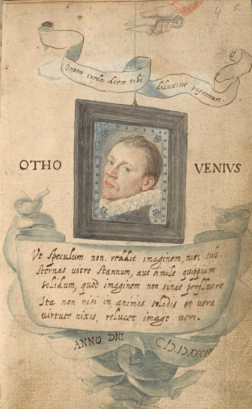
VISU-member prof. Tine L. Meganck and Master's student Astrid J. Luypaert (from our Talent for research program) presented at the symposium Practices of Privacy: Vestiges of Dialogue and its Places in Rome on 30 November, 2022.
The symposium was organized by the Centre for Privacy Studies (University of Copenhagen).
Abstract of the lecture
In 1584, the life of the young painter Otto van Veen or Vaenius (1556-1629) took a decisive turn. After several study years in Rome, he returned to his hometown Leiden, only to leave again for the Southern Low Countries and start his career as an erudite painter. Vaenius marked this pivotal year by two complementary artworks: his family portrait (Paris, Louvre) and an album amicorum (Brussels, Royal Library). The portrait evokes a happy reunion, though we know that religious polarization was dividing the traditionally Catholic family. This outward display of familial harmony contrasts moreover with Vaenius’ personal reflections about fatherland, family, and friendship in the album. Following the Wittenberg tradition, the booklet contains entrees by likeminded, learned friends, among them Justus Lipsius and Dominicus Lampsonius. Less usual, Vaenius included a self-portrait, portraits and poems for his parents and brother as well as emblematic paintings on the relative values of family and friendship.
We argue that the album was not inscribed chronologically, as it has been discussed, but that Vaenius consciously constructed it to come to terms with his shifting identity: from beloved son to gifted pupil, from member of a prominent family to promising author of emblem books. Our lecture will explore the large family portrait and the small album as alternative spaces of privacy, dialogue, and knowledge, shaped both by Van Veen’s private life, as he leaves familial nest and enters the professional world, and by the public arena, as confessional strife redefines the Low Countries
Place
The symposium took place from 30 November until 2 December, 2022, at the Academia Belgica in Rome, the Royal Netherlands Institute in Rome (KNIR) and the the Danish Institute in Rome.
More information on the complete program, here.
